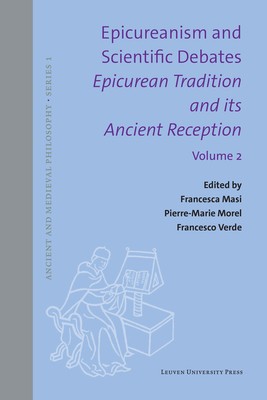
- We will send in 10–14 business days.
- Publisher: Leuven University Press
- ISBN-10: 9462704376
- ISBN-13: 9789462704374
- Format: 15.6 x 23.4 x 1.8 cm, kieti viršeliai
- Language: English
- SAVE -10% with code: EXTRA
Epicureanism and Scientific Debates. Epicurean Tradition and Its Ancient Reception (e-book) (used book) | bookbook.eu
Reviews
Description
Epicurean philosophy is a philosophy of knowledge, nature and pleasure. The second part of a two-volume set, this edited collection examines the core areas of Epicureanism: physiology, epistemology and ethics. The study is carried out from multiple perspectives: the reconstruction and analysis of primary sources, an examination of the debates and controversies surrounding the school of Epicurus, and a review of the reception of Epicurean philosophy. By challenging the widespread stereotype of Epicureanism as a dogmatic, closed system of thought, this volume offers a fresh outlook on this philosophy.
The book includes studies of Epicureans linguistic theory and practice, many fundamental aspects of Epicurean epistemology, physiology and ethics and their reception, the communicative strategy of Epicurean works, and the relationship between philosophy and the sciences.
Contributors: Giuliana Leone (University of Naples, "Federico II"), Pierre-Marie Morel (University of Paris 1 Panthéon-Sorbonne), Geert Roskam (KU Leuven), Francesco Verde (University of Rome Sapienza), Jean Baptiste Gourinat (University of Paris 4, Centre Leon Robin, Sorbonne), Philip Mitsis (New York University), Wim Nijs (KU Leuven), Mauro Bonazzi (University of Bologna), Attila Németh (Eötvös Loránd University of Sciences, Budapest), Stefano Maso (University of Venice Ca' Foscari), Stéphane Marchand (University of Paris 1 Panthéon-Sorbonne), Maddalena Bonelli (University of Bergamo)
EXTRA 10 % discount with code: EXTRA
The promotion ends in 22d.16:24:24
The discount code is valid when purchasing from 10 €. Discounts do not stack.
- Publisher: Leuven University Press
- ISBN-10: 9462704376
- ISBN-13: 9789462704374
- Format: 15.6 x 23.4 x 1.8 cm, kieti viršeliai
- Language: English English
Epicurean philosophy is a philosophy of knowledge, nature and pleasure. The second part of a two-volume set, this edited collection examines the core areas of Epicureanism: physiology, epistemology and ethics. The study is carried out from multiple perspectives: the reconstruction and analysis of primary sources, an examination of the debates and controversies surrounding the school of Epicurus, and a review of the reception of Epicurean philosophy. By challenging the widespread stereotype of Epicureanism as a dogmatic, closed system of thought, this volume offers a fresh outlook on this philosophy.
The book includes studies of Epicureans linguistic theory and practice, many fundamental aspects of Epicurean epistemology, physiology and ethics and their reception, the communicative strategy of Epicurean works, and the relationship between philosophy and the sciences.
Contributors: Giuliana Leone (University of Naples, "Federico II"), Pierre-Marie Morel (University of Paris 1 Panthéon-Sorbonne), Geert Roskam (KU Leuven), Francesco Verde (University of Rome Sapienza), Jean Baptiste Gourinat (University of Paris 4, Centre Leon Robin, Sorbonne), Philip Mitsis (New York University), Wim Nijs (KU Leuven), Mauro Bonazzi (University of Bologna), Attila Németh (Eötvös Loránd University of Sciences, Budapest), Stefano Maso (University of Venice Ca' Foscari), Stéphane Marchand (University of Paris 1 Panthéon-Sorbonne), Maddalena Bonelli (University of Bergamo)


Reviews